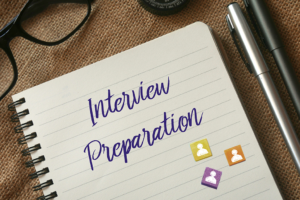Interviewing? Know the difference between passable and excellent.
It may be naivety on my part, but there are some things that still surprise me. One thing in particular is when people ask for “interview tips” the night before an interview. Another is when I’ve already provided instruction for all they can do to prepare, nag them for weeks, and after all that, they still believe they can wing it. There may be a high number of low paying jobs that employers are desperate to fill in today’s market, but for anything really competitive, a “passable” interview performance is not enough. If you’re going after your ideal position, at your ideal company, you’ve got to shoot for “excellent”. The difference between a passable interview and an excellent interview may be all that it takes to knock you out of first place.
A key to success is knowing when to put in the extra effort.
Knowing when to put more effort into something is an important key to success. When mowing your lawn, it may be “passable” to cut down everything, and not spend the time digging out dandelions one by one. Some people may want to spend more time and effort on it, but it is unlikely there’s anything riding on their performance that would dramatically change the course of things (unless they are a landscaper or yard caretaker of course.) A lawn that has been carefully manicured may be admired, but unless your livelihood depends on it, a freshly mowed lawn looks better than one that isn’t. And that’s all that matters. But passable doesn’t cut it if you want to elevate your career.
A mistake that many job seekers make is thinking that throwing a resume in the hat and getting the interview is all they need to land a job. If you’ve always considered outgoing slick-talkers as having the upper hand, you’re wrong. BS-ing your way through an interview went out of fashion a long time ago. Being slick doesn’t equate to having an excellent interview. You may be wondering what makes the difference between passable and excellent in an interview? In one word: preparation. In three words: lots of preparation.
Tailor your resume.
An excellent interview really begins with a relevant resume. Tailoring your resume and cover letter to ensure you have nailed the right language and examples of your work to match their needs and interests is the first step in preparing yourself for an “excellent interview. It’s possible a “passable” resume will still snag an interview, but it won’t prepare you with the right detail for your answers. You need to thoroughly research the company, before you apply to a job.
Relate your experience to the employer’s circumstances.
Another myth that needs to be broken is that you are at the mercy of an interviewer. The ball is not in the employer’s court. It is in yours. It is up to you to immerse yourself in their needs long before the interview. Literal answers to an interviewer’s questions can be passable, but may not be excellent. A literal answer may include real life events that accurately reflect what you have done, but your example may not add much value in the eyes of the employer. An excellent answer will relate your experience to the employer’s circumstances. It will include language they are familiar with. This part requires advance research to fully understand their needs, including conversations with current or past team members.
Advanced research goes beyond the company website.
Taking the time to talk to current or past team members will help you learn about the team’s needs, work styles and preferences. During these conversations, you should be listening for descriptions that mesh with your needs, style and preferences. Use open-ended questions, such as “please describe…, “tell me about…” or “how does…”. Your goal is to gain much more insight than what is included in a job description or on the company’s website. Pay attention if you learn anything that doesn’t seem to fit, or sounds like a red flag. You’ll want to prepare open-ended questions for the interviewers to encourage responses that go beyond a predictable answer. (Much like they will be doing with you.)
Research the interviewers.
Another critical piece to ensuring an excellent interview is to ask who you will be meeting with. Take the time to research each of the interviewers. It’s easy enough to start with the company’s website. Look to see if they are included in the description of the leadership team or in other special initiatives. You can also conduct a Google search to find general information and search for them on LinkedIn to learn about their past experiences, career paths, technical skills and professional interests. Many people have easily found profiles on other social media sites that can shed light on their personalities, styles or interests. Your goal is to learn all that you can about the interviewers’ backgrounds, career paths, interests and technical abilities.
Include key points and relatable examples.
Your research will provide clues to the type of information you should include in your answers and help you determine which experiences they’ll most likely relate to. Tailoring your answers to include key points and relatable examples can make the difference between you and another candidate with identical skills. This added effort will help transform a potentially flat exchange into an easy conversation that elevates your interview to something more than “passable”.
Practicing will help you stay on track.
Finally, one of the most critical elements of an “excellent” interview is to confidently present responses that demonstrate value to the organization as a whole. Myopic thinking (focused only on you and the required job skills) can lead to a passable interview. But it’s also important to demonstrate how well you fit into the greater scheme of things. Understanding your contribution to the bigger picture allows you to present greater value. This doesn’t mean you should over-speak the role. Carefully planning key points that demonstrate your fit with the organization will take your interview to ‘excellent”. Writing out your answers in advance allows you to select the right words and say more with less. Review your thoughts and practicing will help you stay on track. Advance preparation also makes you better equipped to respond to unexpected questions.
The ball really is in your court. Knowing more about the company and the role before you dive in sets you up to succeed. Using that information and being better prepared will give you more control over the outcome of an interview. An excellent interview is much more likely to lead to an offer.
For more career advice on this topic, check out my Unbeatable Interviewing Techniques webinar and follow me on LinkedIn and Twitter.










